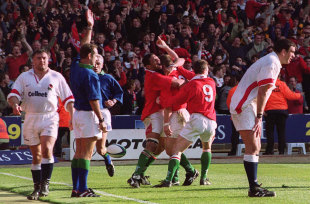|
Five Nations 1999
Gibbs ends English title dream
Scrum.com
April 11, 1999

Scott Gibbs is mobbed by team-mates after scoring the winning try at Wembley
© Getty Images Enlarge
Scott Gibbs can drop that final T form his Christian name. The Wales centre became the toast of Scotland and his last minute try, taking a pass from Wales's other Scott - Quinnell - to crash past a series of tacklers gave Wales victory and Scotland the last ever Five Nations title. The championship trophy was out be-ribboned and ready to be awarded to England when Gibbs charged over. It was hurriedly removed from the Royal Box once Neil Jenkins had coolly landed the conversion and England lost their last chance as Mike Catt fluffed a desperate drop goal attempt. Wales had not previously led and the irony was that England had at times looked more fluent than at any time previously this season. Gibbs and Mark Taylor, in theory Wales's main attacking weapon, had spent most of the afternoon battering unavailingly at England's impregnable midfield defence. But after an excellent first quarter, England fell victim to their old failing of inability to take chances. A record fifth consecutive Triple Crown was lost along with the Grand Slam and the title. But England cannot really complain as Scotland have been consistently the most impressive all-round team. Wales, who went into this match fearing the wooden spoon, which instead goes to France for the first time since 1969, can now approach their tough tour of Argentina and the World Cup with renewed confidence. Maybe it was the effect of Wales being at home while playing in England, but the first half saw a complete role reversal. Previously constipated, England created two beautiful first quarter tries while supposedly free-flowing Wales scarcely threatened the English line and instead landed penalty after penalty through the boot of Neil Jenkins. He was aided in this by yet another counter-stereotype, South African referee Andre Watson, who far from operating the liberal style supposedly associated with Southern Hemisphere referees awarded an endless stream of penalties. England struck within two minutes of the start, the club understanding between Catt and Perry paying off as the outside half's perfectly timed inside pass sent Perry hurtling through the Welsh cover to send Luger galloping to the line. Wilkinson landed the conversion and was on the mark again with a 14th minute penalty. But with Jenkins ruthlessly punishing English infringements, landing three penalties between the fourth and 17th minutes, England led by only a point before their second score. Again Catt flicked out an inside pass. This time the recipient was giant debutant wing Steve Hanley who burst over from close range. Wilkinson crucially missed the simple conversion and two more Jenkins penalties had Wales level by the half hour. Wilkinson landed a 35th minute penalty for England who then looked to have taken a firm grip on the game when Howarth and Thomas collided under a high ball, allowing Hill to dive over and score. Wilkinson converted but Jenkins was on target for the sixth time, in injury time, to keep Wales within range at the break. And they had the perfect start to the second half. Neil Back knocked on in his own 25 and Wales mounted serious pressure from the scrum. Colin Charvis, the outstanding forward from either side, sucked in defenders and a long pass from Jenkins sent Howarth over in the corner. Jenkins' magnificent touchline conversion levelled the scores. But England then took control for most of the second half. Wilkinson kicked them back into the lead with two penalties and captain Lawrence Dallaglio may regret the decision to kick for position rather than go for goal from 40 yards out four minutes from time. Had England taken that opportunity, or any of a number of other openings offered to their backs, Gibbs' try would have been an irrelevance. © Scrum.com
| |||||||||||||||||
Live Sports
Communication error please reload the page.
-
Football
-
Cricket
-
Rugby
-
- Days
- Hrs
- Mins
- Secs
F1 - Abu Dhabi GP
Abu Dhabi Grand Prix December 11-131. Max Verstappen ()
2. Valtteri Bottas (Mercedes)
3. Lewis Hamilton (Mercedes)
4. Alexander Albon ()
5. Lando Norris ()
6. Carlos Sainz Jr ()
-
ESPNOtherLive >>
Golf - Houston Open
Snooker - China Open
Tennis - Miami Open

